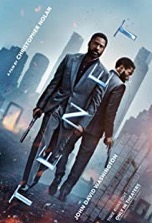December 2020
Tenet (PG-13)
31/12/20 19:09 Filed in: 2020

Starring: John David Washington
September 2020
Warning! This is NOT a movie review. This is a critique of the film. Intended to initiate a dialogue, the following analysis explores various aspects of the film and may contain spoilers. Views are my own and elaborate on comments that were originally tweeted in real time from the back row of a movie theater @BackRoweReviews. For concerns over objectionable content, please first refer to one of the many parental movie guide websites. Ratings are based on a four star system. Happy reading!
“To the degree that it’s not plot, any experimental structure will call attention to itself and often seem visibly artificial. So it has to be managed carefully or the story, the human content, will become secondary to the style. The story may even disappear altogether, lost in the clever externals of its presentation. One of the most damning things that can be said about a story is that it’s an amazing technical achievement.”
Those words come from Ansen Dibell’s Plot. Ironically, that writing resource was published in 1988, five years before CGI took a giant T-Rex leap forward in Jurassic Park (1993). How many CG era films does that “style over substance” indictment describe? A staggering number, I think (I’m looking at you Star Wars prequels).
The first thing that popped into my mind while reading Dibell’s quote was director Christopher Nolan’s Dunkirk (2017). Nolan’s depiction of the eponymous WWII debacle was a visual marvel, yet featured some of the scantiest character development in cinema history. You can read what an epic fail Dunkirk’s story was in my review.
So here we have Tenet, Nolan’s follow-up to Dunkirk. Nolan’s fascination with time (Memento and Interstellar) and the nature of reality (Inception) collide in Tenet. Sadly, Tenet resembles Dunkirk more than those earlier Nolan successes.
Tenet is a rare exception where the trailer is better than the movie. The preview establishes a time-bending reality where generically-named Protagonist (John David Washington) and Neil (Robert Pattinson) experience effect before cause. This causal reversal creates some startling visuals, particularly when we see a crashed car flip over and drive backward through freeway traffic.
However, for all its “amazing technical achievements,” Tenet is clearly missing what the Tin Man yearned for in The Wizard of Oz (1939)…a heart. Lack of heart also was the narrative Achilles’ heel of Dunkirk, which starred Kenneth Branagh (who plays villain Andrei Sator here).
Since Tenet’s sole writing credit belongs to Nolan, the movie’s dearth of genuine human moments has exposed his storytelling inadequacies; in the past, Nolan’s stories were buttressed by the superlative efforts of David S. Goyer and his brother, Jonathan. Nolan fails to reveal significant personal details about any of his characters. Without a connection to the characters, we aren’t really concerned for their safety—the same was true of the cardboard cutouts that populated Dunkirk.
Despite its intriguing premise, Tenet is a wholly uninvolving and unmoving tale due to its shallow characterizations and uninspired performances. Sad to say, but this decorated, scintillating cast is grossly underserved by Nolan’s script. Pattinson is flat, Branagh is unconvincing (especially his beard), Washington is unreasonably overconfident, and Michael Caine and Martin Donovan are mere blips on the radar (which, like tenet, is a palindrome).
Then there’s the question of where the movie’s MacGuffins come from—namely, objects that cause time to flow backwards. Are the artifacts alien in origin? The reference of “somewhere in the future” is egregiously vague (more lazy screenwriting). Also, Sator’s scheme to destroy the world is right out of a 70s James Bond movie. Nothing original here.
Though brilliantly realized, the action sequences actually undermine the film. For example, when we see a fight scene staged backwards earlier in the story, do we really need to see the same sequence played forwards later in the movie? We get the point already.
Worse still, two earlier sequences are revisited later in the movie—the freeway car chase and the melee at the airport. Returning to the same locations and sets feels like a retread and is an egregious waste of screen time, proof positive of the story’s tenuous construction. These hollow and anticlimactic action scenes may induce the sensation of déjà vu, restlessness from boredom, or both.
To the movie’s credit, it makes the audience work to figure out what’s going on—it’s the opposite of mindless entertainment. Also, the movie boasts a few exceptionally well-crafted action set pieces. These pulse-pounding sequences will leave many viewers completely satisfied, regardless of the flaccid story.
However, despite its ambitious high concept premise, Tenet is too long, too confusing and, surprisingly, too monotonous. In the end, the film is an interesting puzzle for the mind, but it isn’t an enjoyable entertainment.
The sequel, teneT, will be this movie played backwards.
Rating: 3 out of 4